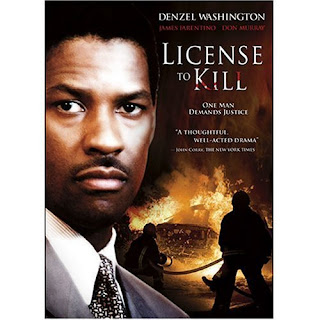
 I’m not really posting this as one of my ongoing ‘Twins’ series of posts, as the Denzil film came out a good five years before the Dalton film (1984 and 1989, film fans). But instead it reminded me of a topic which I’d been intending to post about for a while, and which is partly triggered by the fact that tomorrow is the centenary of Ian Fleming’s birth.
I’m not really posting this as one of my ongoing ‘Twins’ series of posts, as the Denzil film came out a good five years before the Dalton film (1984 and 1989, film fans). But instead it reminded me of a topic which I’d been intending to post about for a while, and which is partly triggered by the fact that tomorrow is the centenary of Ian Fleming’s birth.
When they were talking about the search for a new actor to portray Bond in the films, one thing which I heard several times was ‘they should do a black Bond’ or ‘they should do a female Bond’. Indeed, some folks suggested Colin Salmon should play Bond (he seems a pretty good actor, though having appeared in the films as another character might be seen as making this a bit weird, though then again it didn’t stop Joe Don Baker or Maud Adams), though offhand I can’t recall any casting suggestions being made for a woman to play Bond.
My feelings on this sort of thing (and this applies to suggestions of a female Doctor Who as well, really, though the regeneration aspect at least gives this a slight increase in story logic, if nothing else) are slightly mixed, but I think they tend to boil down to one word: why?
I can see the thinking behind it, and agree with it completely, that there aren’t really that many high-profile non-white or female characters in English-language films (or, indeed, other media), but taking an established character and making them black or female just doesn’t seem the way to remedy this, to my mind.
Taking a comic-based example, I think it’s probably fair to say that the best-known female superhero is Wonder Woman, who was created without reference to existing male superheroes. There are a number of female superheroes who are, effectively, female versions of well-known characters (for example, Spider-Woman or She-Hulk – and no, non-comic readers, I’m not making those up), but they’ve never really taken off, and I rather suspect that’s because their rather derivative origins are all too obvious. Wonder Woman, conversely, is a distinct character, not just a transparent copy.
And in the same way, just ‘making Bond a woman’ seems to be a pretty cheap way to try to make a character popular, as does making him black (similarly, I’m not quite sure if the ‘Ultimate’ Marvel comics version of Nick Fury is really that much more interesting by the change in his race, though I gather it did make the post-credits scene of ‘Iron Man’ inevitable).
Surely the right thing to do is to try to create a female or non-white characters who have their own appeal to an audience? It would certainly seem the more creative way to go about it.
It’s not necessarily easy to do that, sure, but I genuinely believe that characters like Jane Tennison or Blade are much more memorable for not just being knock-offs of existing figures. The origin of a character – in a story and also a more meta- sense – is always likely to be far more interesting if it’s not simply something like “Well, The Fall Guy was popular, so we just made Colt Seavers female and called her Stephanie Plum” (because I’m pretty sure that’s not what Janet Evanovich did, and her novels are wildly popular).
People seem to be pretty good at sussing out when stuff is calculated or even tokenistic, and so I think that trying to make characters popular or appealing by simply tweaking one aspect of a previous hit to re-sell to a different section of your perceived audience is a bit obvious, and will be spotted pretty quickly.
At least, I like to think it’s the case that audiences are smarter than they’re often assumed to be; on a purely selfish level, I’d like to think that because it’ll mean that there will be drama and comedy features that need scripts from people like me, and not just a never-ending slew of reality TV or makeover shows.


Leave a Reply